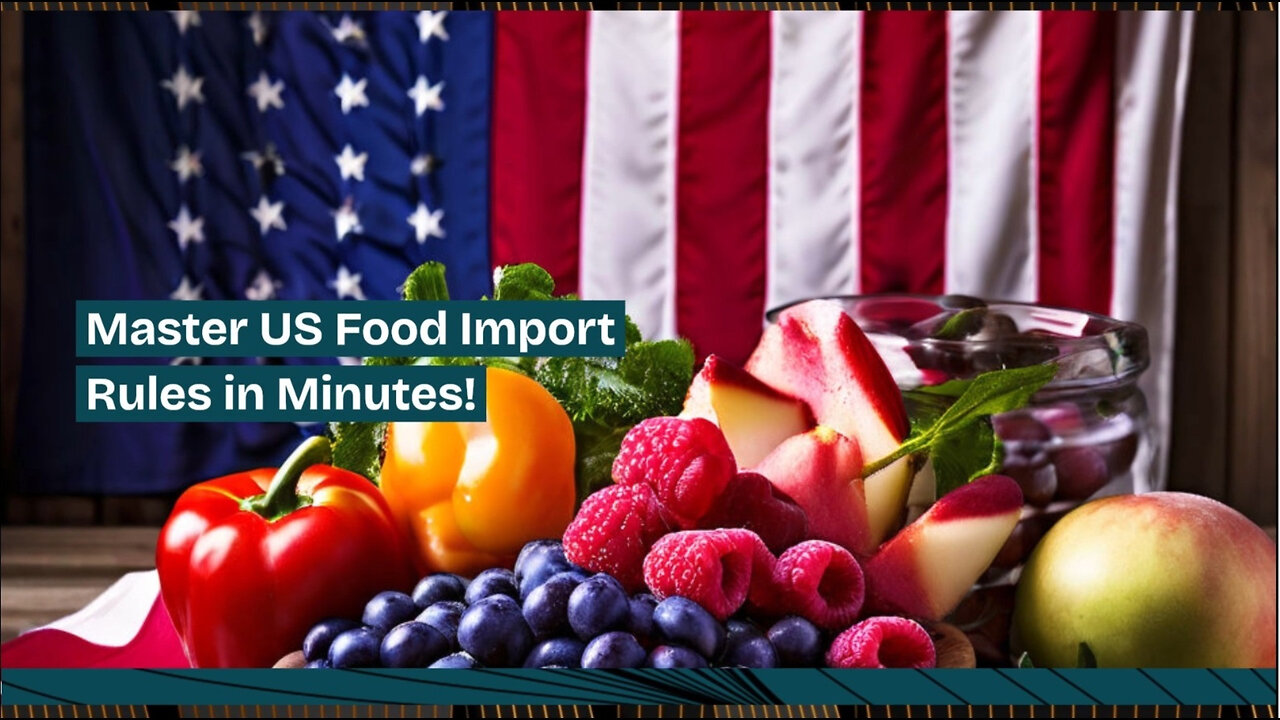Premium Only Content

Navigating the Complexities: Importing Food Products into the USA
ISF Entry | Phone: 800-215-1849 | Email: isf@isfentry.com | https://isfentry.com/
Importing food products into the USA involves several requirements and regulations, starting with the filing of the Importer Security Filing (ISF). This document provides essential information about the shipment and must be filed accurately and in a timely manner. Compliance with the Food and Drug Administration (FDA) is crucial, as they regulate food safety, labeling, and packaging requirements. It is necessary to determine if the products are admissible and comply with FDA regulations, such as manufacturer registration and proper labeling. Obtaining a customs bond is also mandatory; it acts as a financial guarantee for duties, taxes, and penalties. Customs clearance involves the inspection and assessment of imported goods by customs officials, ensuring compliance with documentation and determining appropriate duties. The United States Department of Agriculture (USDA) may also impose specific requirements, especially for meat, poultry, and dairy products. Logistics and transportation considerations, such as reliable shipping methods and proper storage, are also important. Working with a knowledgeable customs broker can simplify the import process and ensure compliance with all regulations.
#usimportbond #isfcustomsbroker #uscustomsclearing #isfentry
Video Disclaimer Here: This educational content is unassociated with US governmental bodies.
00:29 - Understanding Import Requirements: Importing food products into the USA involves navigating complex regulations to ensure compliance with safety standards set by the Food and Drug Administration (FDA) and other regulatory bodies.
01:01 - Key Steps in the Process: Important steps include filing the Importer Security Filing (ISF) accurately, confirming FDA compliance with product labeling and registration, obtaining a customs bond, and preparing for customs clearance.
02:13 - Role of Customs Brokers: Utilizing a knowledgeable customs broker can simplify the import process by assisting with ISF filing, customs bond acquisition, and navigating customs clearance to prevent penalties and delays.
03:21 - Logistics and Compliance: Importers must also manage logistics, including shipping methods and storage, while ensuring compliance with additional regulations from agencies like the United States Department of Agriculture (USDA) for specific food
-
 14:45
14:45
BlabberingCollector
18 hours agoKings Cross Station SET LEAKS! | Harry Potter HBO Show Update & News
1.69K -
 33:20
33:20
SB Mowing
9 days agoHealth Struggles + Endless Rain = A Yard Out of Control
10.2K18 -
 1:09:42
1:09:42
Mike Rowe
4 days agoHow Did THIS Dirty Job Make Tommy Mello A Billionaire?! | #447 | The Way I Heard It
67.9K20 -

SpartakusLIVE
10 hours agoThe BADDEST Duo in WZ Exhibits PEAK Physique || Duos w/ Sophiesnazz to start, quads later
165K1 -
 2:49:37
2:49:37
RattlesnakeTV
21 hours ago $0.29 earnedLIVE DEBATE! Lord Jake vs Crazy Feminist
27K12 -
 4:00:42
4:00:42
Badlands Media
13 hours agoThe Narrative Ep. 35: Codex of Truth
92.9K45 -
 3:55:56
3:55:56
Due Dissidence
16 hours agoSchmuley TRASHES Shapiro, Maxwell Sings For Pardon, Uhuru Doc Preview - Live From St. Louis!
48.3K45 -
 LIVE
LIVE
Lofi Girl
2 years agolofi hip hop radio 📚 - beats to relax/study to
415 watching -
 2:23:21
2:23:21
PandaSub2000
5 days agoMadison VR (Part 4) | PSVR 2000 (Original Live Version)
27.5K2 -
 2:34:32
2:34:32
Badlands Media
5 days agoCODEX 9/11
309K266